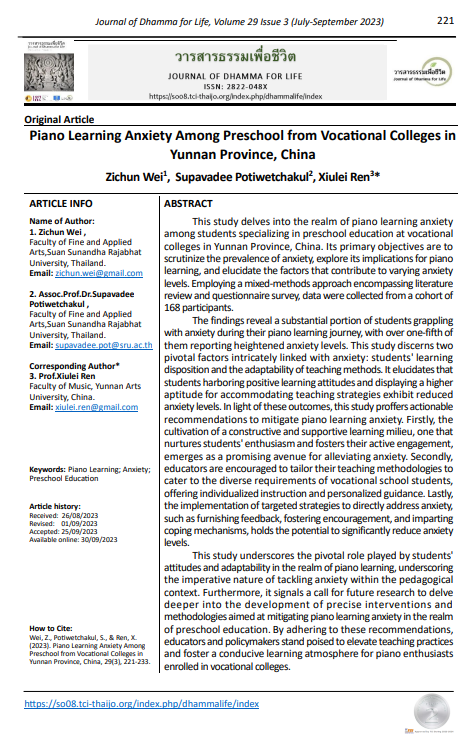Piano Learning Anxiety Among Preschool from Vocational Colleges in Yunnan Province, China
Main Article Content
Abstract
This study delves into the realm of piano learning anxiety among students specializing in preschool education at vocational colleges in Yunnan Province, China. Its primary objectives are to scrutinize the prevalence of anxiety, explore its implications for piano learning, and elucidate the factors that contribute to varying anxiety levels. Employing a mixed-methods approach encompassing literature review and questionnaire survey, data were collected from a cohort of 168 participants.
The findings reveal a substantial portion of students grappling with anxiety during their piano learning journey, with over one-fifth of them reporting heightened anxiety levels. This study discerns two pivotal factors intricately linked with anxiety: students' learning disposition and the adaptability of teaching methods. It elucidates that students harboring positive learning attitudes and displaying a higher aptitude for accommodating teaching strategies exhibit reduced anxiety levels. In light of these outcomes, this study proffers actionable recommendations to mitigate piano learning anxiety. Firstly, the cultivation of a constructive and supportive learning milieu, one that nurtures students' enthusiasm and fosters their active engagement, emerges as a promising avenue for alleviating anxiety. Secondly, educators are encouraged to tailor their teaching methodologies to cater to the diverse requirements of vocational school students, offering individualized instruction and personalized guidance. Lastly, the implementation of targeted strategies to directly address anxiety, such as furnishing feedback, fostering encouragement, and imparting coping mechanisms, holds the potential to significantly reduce anxiety levels.
This study underscores the pivotal role played by students' attitudes and adaptability in the realm of piano learning, underscoring the imperative nature of tackling anxiety within the pedagogical context. Furthermore, it signals a call for future research to delve deeper into the development of precise interventions and methodologies aimed at mitigating piano learning anxiety in the realm of preschool education. By adhering to these recommendations, educators and policymakers stand poised to elevate teaching practices and foster a conducive learning atmosphere for piano enthusiasts enrolled in vocational colleges.


